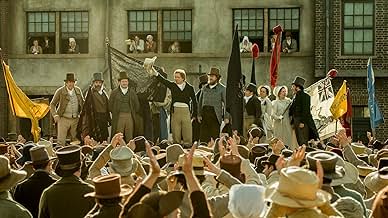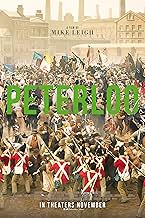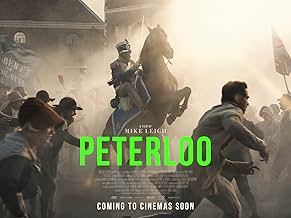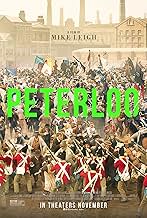IMDb RATING
6.5/10
5.8K
YOUR RATING
The story of the 1819 Peterloo Massacre in which British forces attacked a peaceful pro-democracy rally in Manchester.The story of the 1819 Peterloo Massacre in which British forces attacked a peaceful pro-democracy rally in Manchester.The story of the 1819 Peterloo Massacre in which British forces attacked a peaceful pro-democracy rally in Manchester.
- Awards
- 4 wins & 8 nominations total
- Director
- Writer
- All cast & crew
- Production, box office & more at IMDbPro
Featured reviews
Mike Leigh's historical epic Peterloo, details the events that led to Manchester's devastating 1819 Peterloo Massacre, which saw the British Tory government ordering a brutal military charge into a working-class crowd of peaceful pro-democracy protestors. It's a well directed historical film that talks about the events which happened 200 years ago - yet at the same time lashes out at present-day politics.
This film is the result of hard work. Running for 154 minutes, dozens of characters and lots of conversations that all build up to its titular origin. Peterloo is an "experience". Let me clarify: the slow-march toward the awful event is so exciting, that by the way the battle is staged, it all feels so real and even more aggressive. These victims didn't see any of it coming and actions like this still happen up to this day. It's interesting to see a seemingly more arthouse film with a serious subject, get promoted as if it was a commercial blockbuster. That makes me ask the question, if they couldn't have turned it up a notch and make this into a blockbuster with more of a budget and still hold on to its script, to make everything even more epic and reach a wider audience.
The opening sequence puts Joseph (David Moorst), a soldier son of a mill-workers family who's suffering from PTSD, in the spotlight. He's covered in dirt and blood in the middle of Waterloo, where Britain just victoriously won the battle. We follow him on his way home, wearing his military redcoat that's looking rougher by the minute. There's not really a protagonist in this story, we get to see different point of views throughout the film, though most screen time is reserved for Joseph's family. They basically stand for a community in the middle of revolution - infuriated by post-war poverty, Parliament's refusal to extend the vote to the working class and import restrictions. Joseph's father (Pearce Quigley) attends meetings with radicals, his mother Nellie (a magnificent Maxine Peake) remains her smug self, skeptical of change that will never happen anyway.
We soon see another point of view, with spies delivering reports from these radical-meetings to the powerful rich, angry, white men in black robes who love to sanction everyone and everything that doesn't comply to their point of view on society. These magistrates appoint Sir John Byng (Alastair Mackenzie) as the Northern District commander because of his lack of political interest. These "gentlemen" conclude that upper-class orator Henry Hunt (Rory Kinnear) is their best chance to get some attention from higher-ups, but he is the one that plans a non-violent demonstration on St. Peter's Field in Manchester, for his democratic followers.
Dick Pope channels 19th century paintings with his cinematography. Which is wonderful for some shots, but gets tiring when everything gets the same half-lit look. Performances by Peake and Kinnear are extraordinary and especially the latter stands out with multiple layers to his character, not afraid to take it to a next level of acting. Jon Gregory's exquisite editing skills, give us a clear look at the massacre, focusing on each victim and the violence that everybody had to endure.
Peterloo's finale will outrage you and delivers on its buildup. This is still an arthouse film and the battle at St. Peter's Field misses the grandeur of other historic epos, but it concentrates on the characters we met and respects these storylines like only writer and director Mike Leigh could've done. Peterloo isn't perfect, but it is unexpected in every way and one stirring piece of filmmaking that you don't want to miss.
This film is the result of hard work. Running for 154 minutes, dozens of characters and lots of conversations that all build up to its titular origin. Peterloo is an "experience". Let me clarify: the slow-march toward the awful event is so exciting, that by the way the battle is staged, it all feels so real and even more aggressive. These victims didn't see any of it coming and actions like this still happen up to this day. It's interesting to see a seemingly more arthouse film with a serious subject, get promoted as if it was a commercial blockbuster. That makes me ask the question, if they couldn't have turned it up a notch and make this into a blockbuster with more of a budget and still hold on to its script, to make everything even more epic and reach a wider audience.
The opening sequence puts Joseph (David Moorst), a soldier son of a mill-workers family who's suffering from PTSD, in the spotlight. He's covered in dirt and blood in the middle of Waterloo, where Britain just victoriously won the battle. We follow him on his way home, wearing his military redcoat that's looking rougher by the minute. There's not really a protagonist in this story, we get to see different point of views throughout the film, though most screen time is reserved for Joseph's family. They basically stand for a community in the middle of revolution - infuriated by post-war poverty, Parliament's refusal to extend the vote to the working class and import restrictions. Joseph's father (Pearce Quigley) attends meetings with radicals, his mother Nellie (a magnificent Maxine Peake) remains her smug self, skeptical of change that will never happen anyway.
We soon see another point of view, with spies delivering reports from these radical-meetings to the powerful rich, angry, white men in black robes who love to sanction everyone and everything that doesn't comply to their point of view on society. These magistrates appoint Sir John Byng (Alastair Mackenzie) as the Northern District commander because of his lack of political interest. These "gentlemen" conclude that upper-class orator Henry Hunt (Rory Kinnear) is their best chance to get some attention from higher-ups, but he is the one that plans a non-violent demonstration on St. Peter's Field in Manchester, for his democratic followers.
Dick Pope channels 19th century paintings with his cinematography. Which is wonderful for some shots, but gets tiring when everything gets the same half-lit look. Performances by Peake and Kinnear are extraordinary and especially the latter stands out with multiple layers to his character, not afraid to take it to a next level of acting. Jon Gregory's exquisite editing skills, give us a clear look at the massacre, focusing on each victim and the violence that everybody had to endure.
Peterloo's finale will outrage you and delivers on its buildup. This is still an arthouse film and the battle at St. Peter's Field misses the grandeur of other historic epos, but it concentrates on the characters we met and respects these storylines like only writer and director Mike Leigh could've done. Peterloo isn't perfect, but it is unexpected in every way and one stirring piece of filmmaking that you don't want to miss.
This is the first review I've ever done, but was moved to do so by some reviews that I have read on here since watching the film. So apologies to you experts, but here's my tuppenceworth. On the down side, a bit overlong, could have been a bit less wordy and faster paced. But, I left the cinema with the same feeling that I did in the early 70s after seeing Soldier Blue: stunned by the brutality of "the authorities" over the disenfranchised. Forensic in its drama/documentry approach and absolutely true to events (I have since checked various historical sources). This is what happens when people feel they lack a voice and does resonate with today's UK. I thought the lighting was superb and the epic, grand scale setting rare in a UK film. A must watch for teenagers who will not have heard of this event in history at school.
"Rise like Lions after slumber in unvanquishable number- Shake your chains to earth like dew Which in sleep had fallen on you- Ye are many-they are few." Shelley, from The Masque of Anarchy
No contemporary director depicts and loves the working class better than Mike Leigh: look at Secrets and Lies for the best example. Believing that not enough people know about the massacre in 1819 in Manchester, where the British army slaughtered 18 and wounded scores of commoners peacefully assembling for liberty and rights, Leigh filmed Peterloo, the popular name for the uprising.
With an ear for local locutions and pompous preening, Leigh alternates between the people and their monarchial rulers, showing the sincerity of the marchers and the fear of the magistrates, who wish for nothing more than a Waterloo to stem the French-revolution-like yearnings of the folk. When administrators order the soldiers to squash the gathering, it's the beginning of responsible press reporting the malignity of entrenched rulers.
Leigh's longtime cinematographer, Dick Pope, has exceptional shots of the laborers and their homes to rival the best work of Millet and Courbet. The framing arches and rolling fields provide Pope with contours and colors to complement the dignity and vitality of the people.
However, it's Leigh's unfailing ear for diction and eye for metaphor that distinguish him as a David Lean of the working class. Contrasting the magistrates clustered around drafting the warrants for the crowd and the almost lyrical happiness of the assembly not only sets up the worlds of sad and happy, but they also heighten the terror as the innocent are vanquished by the proud.
Out of this debacle came a strong press that began and never stopped evaluating the ruling class. All hail the emergence of the Manchester Guardian.
"Let a great Assembly be Of the fearless and the free On some spot of English ground Where the plains stretch wide around." Shelley
No contemporary director depicts and loves the working class better than Mike Leigh: look at Secrets and Lies for the best example. Believing that not enough people know about the massacre in 1819 in Manchester, where the British army slaughtered 18 and wounded scores of commoners peacefully assembling for liberty and rights, Leigh filmed Peterloo, the popular name for the uprising.
With an ear for local locutions and pompous preening, Leigh alternates between the people and their monarchial rulers, showing the sincerity of the marchers and the fear of the magistrates, who wish for nothing more than a Waterloo to stem the French-revolution-like yearnings of the folk. When administrators order the soldiers to squash the gathering, it's the beginning of responsible press reporting the malignity of entrenched rulers.
Leigh's longtime cinematographer, Dick Pope, has exceptional shots of the laborers and their homes to rival the best work of Millet and Courbet. The framing arches and rolling fields provide Pope with contours and colors to complement the dignity and vitality of the people.
However, it's Leigh's unfailing ear for diction and eye for metaphor that distinguish him as a David Lean of the working class. Contrasting the magistrates clustered around drafting the warrants for the crowd and the almost lyrical happiness of the assembly not only sets up the worlds of sad and happy, but they also heighten the terror as the innocent are vanquished by the proud.
Out of this debacle came a strong press that began and never stopped evaluating the ruling class. All hail the emergence of the Manchester Guardian.
"Let a great Assembly be Of the fearless and the free On some spot of English ground Where the plains stretch wide around." Shelley
If I have a criticism of this film, it would be that it's half an hour too long. Mike can be a bit self indulgent, there where a few scenes that were just there for colour. Technically accomplished, well acted, and faithfully accurate to the history. If you like social history you will not be disappointed.
As with most movies today, the extremes are over-represented and the underlying issues barely addressed. England was reeling from a Napoleanic, banker-funded war, ending in oppressive debt for the major powers of Europe. The Bank of England and the Bank of France were both formed to lend money to their respective governments, with few constraints on the pyramiding, in order to fund regular wars. The French revolution was trying to spread its socialist conclusions. Men are represented as either cruel, money-grubbing wealthy industrialists or poor, woe-is-me peasant labor, although one could hardly call people who had several sets of clothes, a house and sets of dishes as poor. The gratuitous men-oppress-their-more-intelligent-women folk is consistent with modern social justice bleatings. Consequently, what we see is the plight of what the French called the bourgeoisie, or the merchant and skilled labor class. The entrenched oligarchies were hanging on to their power, generated by industrial technological expansions (in this case the mechanical loom), which ironically needed skilled laborers and supporting merchants, who also were gaining wealth, counter to the woe-is-me picture. Much of the problem was the government-imposed lack of producers' and laborers' ability to negotiate the price of their labor and the markets for their products. The many government-oligopoly controls on cloth production are not presented, but were responsible for most of the tension. Of course, these issues would hardly sell to uninformed viewers.
As with the onset of the French revolution, the key issue is never quite resolved in these movies, or in the social justice bleatings of today: after the dust settles, who will be in charge and what will the new rules be? Will the current oppressors be replaced by worse oppressors? Meet the new boss, same as the old boss, both in labor and management. Government meddling has and will cause tragedy.
As with the onset of the French revolution, the key issue is never quite resolved in these movies, or in the social justice bleatings of today: after the dust settles, who will be in charge and what will the new rules be? Will the current oppressors be replaced by worse oppressors? Meet the new boss, same as the old boss, both in labor and management. Government meddling has and will cause tragedy.
Did you know
- TriviaThe film was released 200 years after the Peterloo Massacre.
- GoofsThe young Waterloo veteran who continues to wear his redcoat during the film can be seen in one shot with Corporal stripes whereas the rest of the film his tunic is that of a Private.
- Quotes
Prince Regent: I know what is good for my people better than they know themselves!
- ConnectionsFeatured in Granada Reports: 16 August 2018: Evening Bulletin (2018)
Details
- Release date
- Country of origin
- Official sites
- Language
- Also known as
- La tragèdia de Peterloo
- Filming locations
- Hebden Bridge, West Yorkshire, England, UK(Workers being drilled before marching)
- Production companies
- See more company credits at IMDbPro
Box office
- Gross US & Canada
- $151,971
- Opening weekend US & Canada
- $26,002
- Apr 7, 2019
- Gross worldwide
- $2,159,214
- Runtime
- 2h 34m(154 min)
- Color
- Sound mix
- Aspect ratio
- 1.85 : 1
Contribute to this page
Suggest an edit or add missing content








































